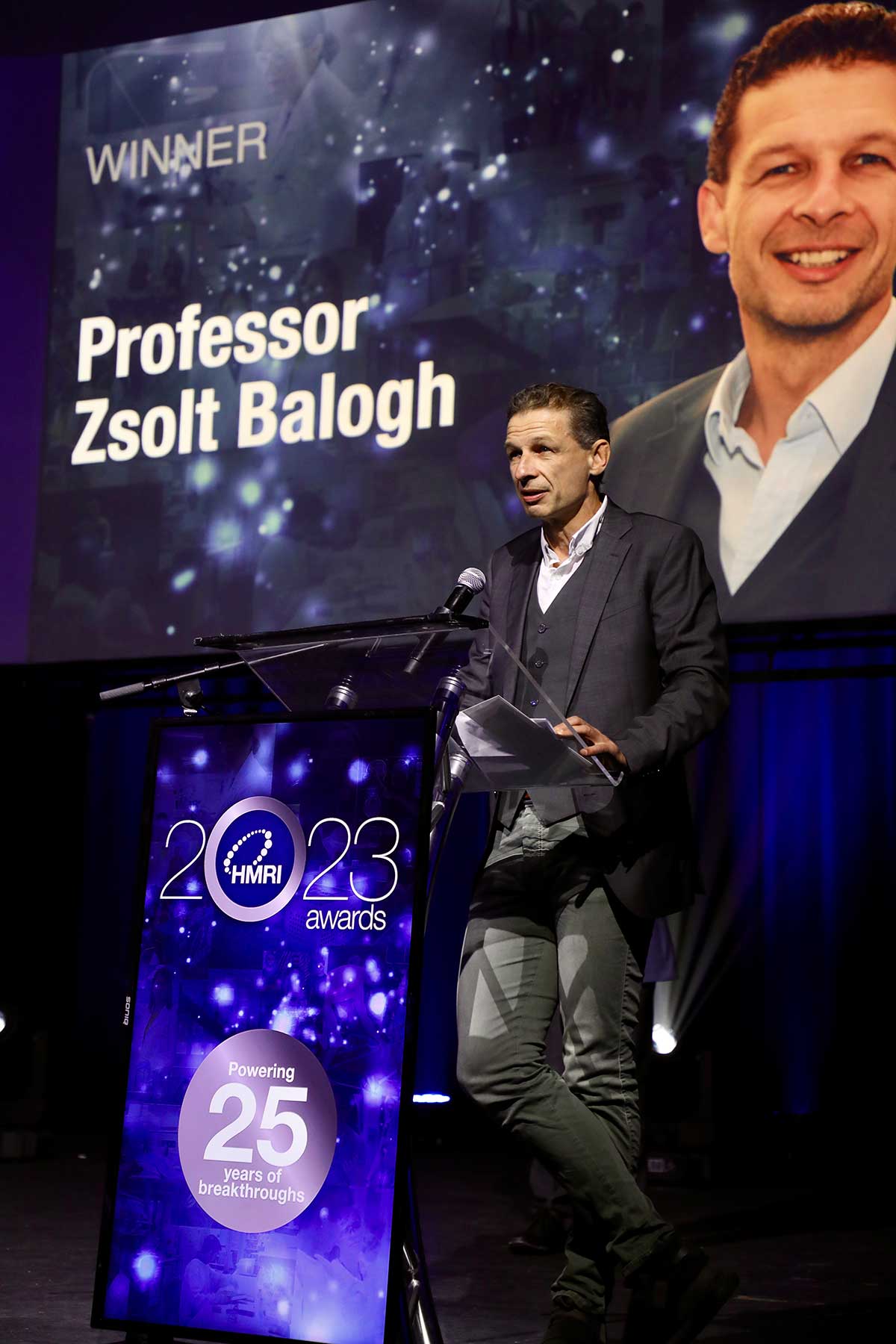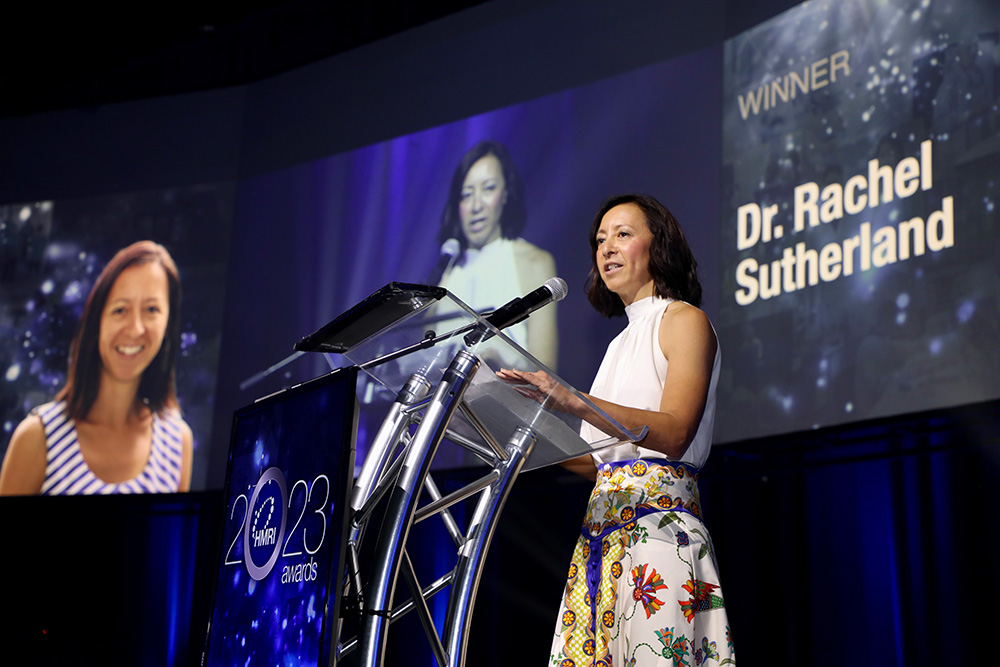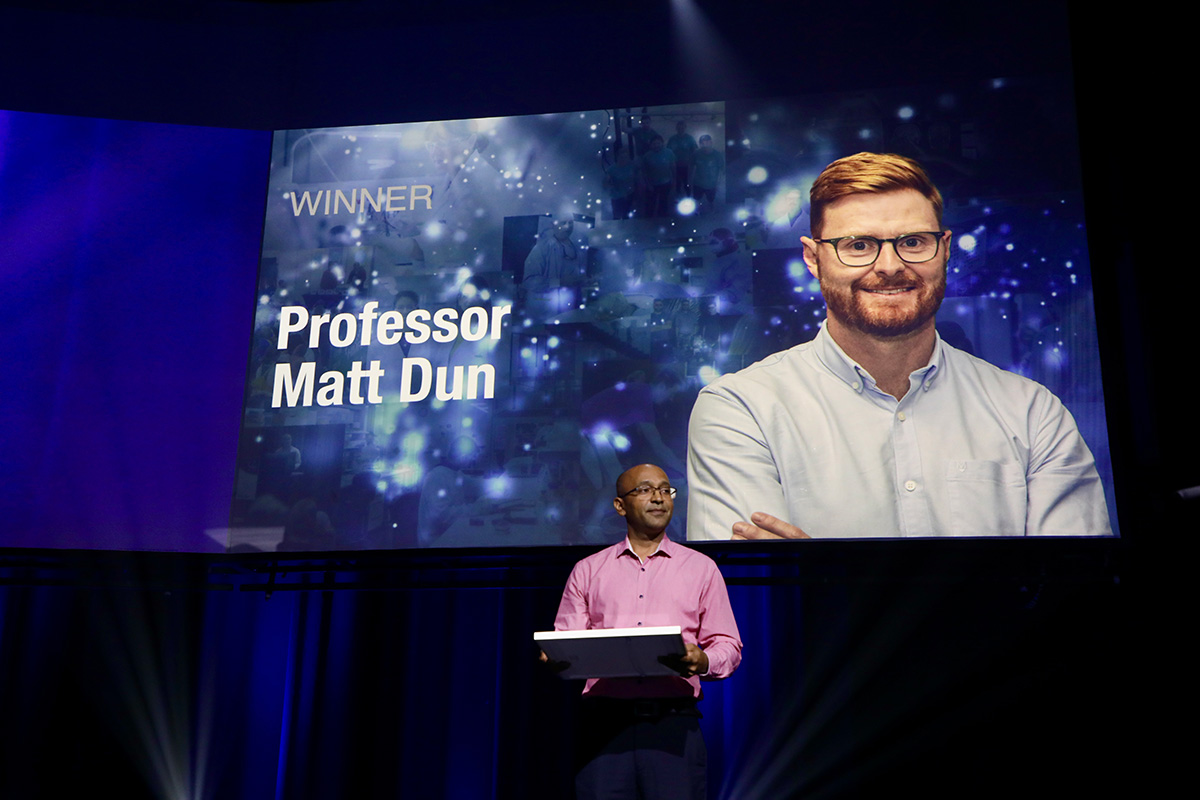2023 HMRI Researcher of the Year award winners celebrated
In an awards ceremony held at NEX on Friday 8 December in front of an audience of donors, colleagues and community members, three researchers and a research team were honoured with the Hunter’s top research prize.
 In an awards ceremony held at NEX on Friday 8 December in front of an audience of donors, colleagues and community members, three researchers and a research team were honoured with the Hunter’s top research prize.
In an awards ceremony held at NEX on Friday 8 December in front of an audience of donors, colleagues and community members, three researchers and a research team were honoured with the Hunter’s top research prize.
The major gong for 2023, the HMRI Award for Research Excellence, went to Professor Zsolt Balogh from the Trauma and Injury Program. Professor Balogh won $20,000 to go towards his research. Professor Balogh is Director of Trauma at John Hunter Hospital, and Professor of Surgery at the University of Newcastle.
The Director’s Award for Mid-Career Research went to Associate Professor Matt Dun from the Cancer Research Program for his research into Diffuse Intrinsic Pontine Glioma (DIPG), an aggressive form of brain cancer. Professor Dun, a NHMRC Emerging Leadership Fellow, also won $20,000 that will go to his dedicated research lab at the University of Newcastle.
The HMRI Award for Early Career Research was awarded to to Dr Rachel Sutherland for her work in preventing childhood obesity via the SWAP it campaign that urged parents to swap high energy, low nutrient lunchbox snacks for healthier options. She has won $20,000 to go towards her Population Health research. She is Nutrition Program Manager at Hunter New England Local Health District and a NHMRC MRFF Investigator Fellow at the University of Newcastle.
The HMRI Foundation Research Team Excellence Award went to the Newcastle Centre of Excellence in Cardio-Oncology led by Professor Aaron Sverdlov and Professor Doan Ngo. The team, made up of PhD and post-doctorate students, early career, mid-career and senior researchers, received $30,000 in prize money to go towards their research into cardio-protective drug therapies for cancer patients.
HMRI Director and Institute CEO Professor Frances Kay-Lambkin says, “These awards recognise the hard work, determination and commitment of these researchers in seeking answers to some of our biggest health challenges. I congratulate all the winners for their lasting impact on improving the wellbeing of our community.”
Winners and finalists
Early-Career finalists
Dr Carlos Garcia-Esperon is a stroke neurologist, and researcher in HMRI's Heart and Stroke research program. One of Dr Garcia-Esperon's major achievements was his role in delivering acute telestroke services across NSW which has delivered over 5,000 specialist consultations and over 700 repurfusion therapies. He is passionate about improving stroke care in rural areas through the use of virtual reality to improve medical staff training. Dr Garcia-Espero has also pioneered a rural telestroke clinic, and looks to continue to expand this initiative to additional hospitals.
 Dr Rachel Sutherland, is a dietitian and researcher in HMRI's Population Health program. Her work seeks to reduce to burden of chronic diseases on individuals, families, and the community through the use of innovative, co-designed technology -based interventions. A global leader in health promotion, she has pioneered major initiatives, including Australia's largest child obesity prevention service, Good for Kids. Good for Life, and the scalable healthy lunchbox program SWAP IT.
Dr Rachel Sutherland, is a dietitian and researcher in HMRI's Population Health program. Her work seeks to reduce to burden of chronic diseases on individuals, families, and the community through the use of innovative, co-designed technology -based interventions. A global leader in health promotion, she has pioneered major initiatives, including Australia's largest child obesity prevention service, Good for Kids. Good for Life, and the scalable healthy lunchbox program SWAP IT.
Dr Shafiq Syed is a researcher in HMRI's Cancer Detection and Therapy research program and his work addresses one of the most critical health issues in Australia - gynecological cancer. His research uniquely integrates mathematical principles, nanotechnology, and stem cell biology to revolutionise disease diagnostics and therapeutics, and has gained international recognition as an expert in stem cell biology.
Teams
Burn 2 Learn: Led by Professor David Lubans, the team has designed a groundbreaking high-intensity physical activity intervention for 16-19-year-olds in Australian schools. This teacher-led initiative boosts physical and mental health, plus classroom engagement. In partnership with the NSW Department of Education, 315 teachers from 218 schools have been trained, reaching around 18,900 students.
Newcastle Centre of Excellence in Cardio-Oncology: Led by Professors Aaron Sverdlov and Doan Ngo, this centre addresses the link between cancer and cardiovascular disease. Recognising the heightened risk for cardiovascular issues in long-term cancer survivors, the team has made groundbreaking advancements. They've identified a dual-purpose medication that treats cancer while safeguarding the heart from anti-cancer medication effects. Additionally, they've established a pioneering cardio-oncology service, a first in the nation, to enhance health outcomes for people living with cancer.
Mid-Career finalists
 Professor Matt Dun, is a discovery scientist and Deputy Leader of HMRI's Precision Medicine research program. A highly accomplished researcher, Professor Dun is dedicated to eradicating the deadliest childhood disease, DIPG/DMG, an aggressive form of brain tumour.
Professor Matt Dun, is a discovery scientist and Deputy Leader of HMRI's Precision Medicine research program. A highly accomplished researcher, Professor Dun is dedicated to eradicating the deadliest childhood disease, DIPG/DMG, an aggressive form of brain tumour.
Professor Dun has become a major contributor to the scientific advancement of understanding the disease biology, with collaborations and connections with academic institutions across Australia and the world.
His work has led to the commencement of an adaptive combination therapy international phase II clinical trial for patients diagnosed with DMG, which is already seeing promising results.
Professor Nikola Bowden, is Co-Director of HMRI's Drug Repurposing and Medicines research program and the Vanessa McGuigan HMRI Mid-Career Fellow in ovarian cancer. A cornerstone of Professor Bowden's research involves screening existing drugs and repurposing them for potential use in treating cancer. Most recently, Professor Bowden and her multidisciplinary team of researchers, cancer consumers, and clinicians have worked together to conduct a phase II trial for treatment-resistant melanoma, which has led to improved survival for people with cancer in the Hunter region and across Australia.
Professor Joshua Davis, is the director of HMRI's Infection Research program, and a Senior Staff Specialist in Infectious Diseases at Newcastle's John Hunter Hospital.
Professor Davis's work centres on improving the evidence base for common, severe infectious diseases through the design, conduct, and analysis of quality, innovative clinical trials.
In his capacity as a clinician-scientist, Professor Davis played a significant role in Australia’s COVID-19 response, including designing, launching and co-leading the Australian COVID-19 trial, ASCOT, as well as leading the development of COVID-19 guidelines for the Hunter New England local health district. Professor Davis is currently co-leading an international clinical trial investigating the management of blood stream infections in 7,000 patients.
Research Excellence Award finalists
Professor Nathan Bartlett, is a viral immunologist, leader of the Viral Immunology and Respiratory Disease Group and a member of HMRI’s Infection Research program.
Professor Bartlett has dedicated over 20 years to the study of viral disease pathogenesis. He is a nationally and internationally recognised expert in rhinovirus, COVID-19, influenza and respiratory viral diseases, asthma, and COPD. Professor Bartlett played a significant role in the Australia COVID-19 response, his prior research allowing him and his team to be strategically and uniquely positioned to assist with the response both locally and in collaboration with other research institutes.
Notably, Professor Barlett has utilised his pre-clinical research of rhinovirus and coronavirus infection to develop a nasal spray to assist in protection against common respiratory viruses, which has now completed phase 2 clinical trials.
Professor Barlett has published over 90 peer-reviewed publications, has almost 6,000 citations and has contributed significantly to enhancing public knowledge and education through science communication and media engagement.
Professor Jeanette Lechner Scott is a neurologist at Newcastle’s John Hunter Hospital and a researcher in HMRI’s Immune Health research program. Professor Lechner-Scott has led the Multiple Sclerosis (MS) research team at HMRI since 2005 has significantly contributed to better outcomes for people with MS, translating her global work to provide better outcomes locally in the Hunter New England region. She established the first specialised MS clinic in the Hunter region, and is a trailblazer with respect to consumer involvement in research. She has published over 200 peer-reviewed articles, over 19,000 citations, been a principal investigator in over 30 clinical trials, and has built a multi-disciplinary team of researchers, clinicians and consumers that have attained international recognition as being a leading centre for MS epigenetics and novel MRI techniques.
Professor Zsolt Balogh is Director of HMRI’s Injury and Trauma Research program and Director of Trauma at Newcastle’s John Hunter Hospital, the largest volume and lowest mortality trauma centre in NSW.
Outside of his clinical role, which sees him perform around 1,000 surgical operations each year and review 80 outpatients each week, and his role as convenor of the Master of Traumatology postgraduate program at the University of Newcastle, Professor Balogh demonstrates dedication to the importance of medical research through personal investment of time to research activities.
As a result of this dedication, he has authored over 300 peer-reviewed articles, has been cited over 24,000 times and has convened a multi-disciplinary team of clinical researchers at HMRI dedicated to reducing the burden from injury, the 3rd leading cause of death.
Related news
- From the Classroom to the Operating Room: Emily Mason’s Journey as an Indigenous Female Surgeon
- Partnering to prevent local extinction of threatened marsupial
- Launch of the School Students’ Statement on the Right to a Healthy Environment
- Funding boost to technology for lower emission steel
- Newcastle team on mission to improve childhood cancer outcomes
The University of Newcastle acknowledges the traditional custodians of the lands within our footprint areas: Awabakal, Darkinjung, Biripai, Worimi, Wonnarua, and Eora Nations. We also pay respect to the wisdom of our Elders past and present.